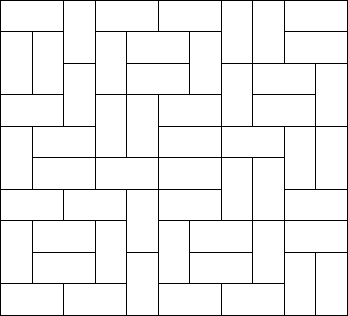POJ 2411
Mondriaan's Dream
| Time Limit: 3000MS | Memory Limit: 65536K | |
| Total Submissions: 9614 | Accepted: 5548 |
Description
Squares and rectangles fascinated the famous Dutch painter Piet Mondriaan. One night, after producing the drawings in his 'toilet series' (where he had to use his toilet paper to draw on, for all of his paper was filled with squares and rectangles), he dreamt of filling a large rectangle with small rectangles of width 2 and height 1 in varying ways.

Expert as he was in this material, he saw at a glance that he'll need a computer to calculate the number of ways to fill the large rectangle whose dimensions were integer values, as well. Help him, so that his dream won't turn into a nightmare!

Expert as he was in this material, he saw at a glance that he'll need a computer to calculate the number of ways to fill the large rectangle whose dimensions were integer values, as well. Help him, so that his dream won't turn into a nightmare!
Input
The input contains several test cases. Each test case is made up of two integer numbers: the height h and the width w of the large rectangle. Input is terminated by h=w=0. Otherwise, 1<=h,w<=11.
Output
 For each test case, output the number of different ways the given rectangle can be filled with small rectangles of size 2 times 1. Assume the given large rectangle is oriented, i.e. count symmetrical tilings multiple times.
For each test case, output the number of different ways the given rectangle can be filled with small rectangles of size 2 times 1. Assume the given large rectangle is oriented, i.e. count symmetrical tilings multiple times.
Sample Input
1 2 1 3 1 4 2 2 2 3 2 4 2 11 4 11 0 0
Sample Output
1 0 1 2 3 5 144 51205
Source
挺有意思的一道DP,给你一片空地的长和宽,让你用1 * 2的长方形填充空地,使之填满,问有多少种不同的方案。
我是按照Discuss里的一位大神的思路写的,Orz。。。
用2进制的01表示不放还是放 第i行只和i-1行有关 枚举i-1行的每个状态,推出由此状态能达到的i行状态 如果i-1行的出发状态某处未放,必然要在i行放一个竖的方块,所以我对上一行状态按位取反之后的状态就是放置了竖方块的状态。 然后用搜索扫一道在i行放横着的方块的所有可能,并且把这些状态累加上i-1的出发状态的方法数,如果该方法数为0,直接continue。 举个例子 2 4 1111 1111 状态可以由 1100 0000 0110 0011 1111 0000 0000 0000 0000 0000 这五种i-1的状态达到,故2 4 的答案为5代码如下:PS:这里科普一下运算符的优先级 http://blog.csdn.net/acm_xmzhou/article/details/9804983
#include <cstdio>
#include <cmath>
#include <algorithm>
#include <iostream>
#include <cstring>
#include <map>
#include <string>
#include <stack>
#include <cctype>
#include <vector>
#include <queue>
#include <set>
using namespace std;
//#define Online_Judge
#define outstars cout << "***********************" << endl;
#define clr(a,b) memset(a,b,sizeof(a))
#define FOR(i , x , n) for(int i = (x) ; i < (n) ; i++)
#define FORR(i , x , n) for(int i = (x) ; i <= (n) ; i++)
#define REP(i , x , n) for(int i = (x) ; i > (n) ; i--)
#define REPP(i ,x , n) for(int i = (x) ; i >= (n) ; i--)
const int MAXN = 100 + 50;
const int maxw = 100 + 20;
const int MAXNNODE = 1000000 +10;
const long long LLMAX = 0x7fffffffffffffffLL;
const long long LLMIN = 0x8000000000000000LL;
const int INF = 0x7fffffff;
const int IMIN = 0x80000000;
#define eps 1e-8
#define mod 1000000007
typedef long long LL;
const double PI = acos(-1.0);
typedef double D;
typedef pair<int , int> pi;
LL dp[30][1 << 12], i , j , m , n , key = 1;///d[i][j]中i为该状态行数,j为二进制表示的该行状态,1为有木块,0为没有
///d[i][j]的值为该状态下的方法数
void solve(int i , int s , int pos)
{
if(pos == m)///最后一列累加前i行的方法数
{
dp[i][s] += key;
return ;
}
solve(i , s , pos + 1);///不放木块等待下一行竖放
if(pos <= m - 2&&!(s&1 << pos)&&!(s&1 <<(pos + 1)))///可以横放:<= m - 2&&第pos位和第pos + 1位为0(无木块)
solve(i , s|1 << pos|1 << pos + 1 , pos + 2);///把pos和pos+ 1为改为1,然后继续从pos + 2位solve
}
int main()
{
//ios::sync_with_stdio(false);
#ifdef Online_Judge
freopen("in.txt","r",stdin);
freopen("out.txt","w",stdout);
#endif // Online_Judge
while(scanf("%d%d",&n, &m),(m||n))
{
clr(dp , 0);
key = 1;
solve(1 , 0 , 0);///先求出第一行的状态
FORR(i , 2 , n)for(int j = 0 ; j < 1 << m ; j++)
{
if(dp[i - 1][j])key = dp[i - 1][j];
else continue;///i - 1行没放木块
solve(i , ~j&((1 << m) - 1) , 0);///只给j位取了反
}
printf("%lld\n",dp[n][(1 << m) - 1]);///终状态的方法数
}
return 0;
}
还有一位大神用的插头DP,看不懂就不解释了。。。
代码如下:
#include<iostream>
#include<cstring>
using namespace std;
long long f[2][1<<12],i,j,ps,p=0,c=1,n,m;
int main()
{
while (scanf("%d%d",&n,&m),n!=0)
{
memset(f[c],0,sizeof(f[c]));
f[c][(1<<m)-1]=1;
for (i=0;i<n;i++)
for (j=0;j<m;j++)
{
swap(p,c);memset(f[c],0,sizeof(f[c]));
for (ps=0;ps<1<<m;ps++)
if (f[p][ps])
{
if (j>0&&(!(ps&(1<<j-1)))&&(ps&(1<<j))) f[c][ps|1<<(j-1)]+=f[p][ps];
if (!(ps&1<<j)) f[c][ps|1<<j]+=f[p][ps];
if (ps&1<<j) f[c][ps^1<<j]+=f[p][ps];
}
}
printf("%lld\n",f[c][(1<<m)-1]);
}
}


